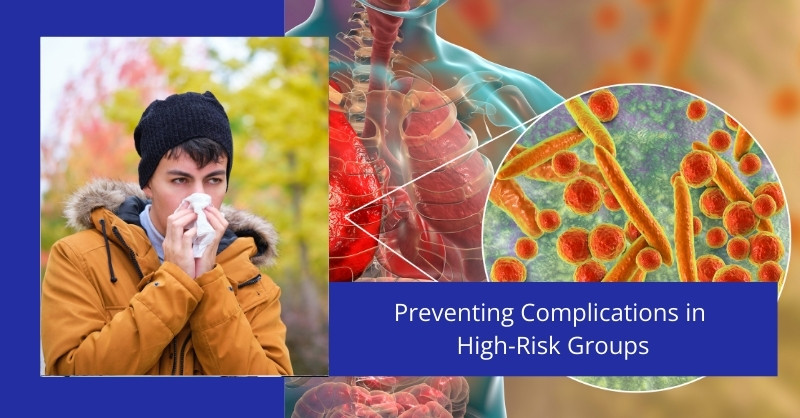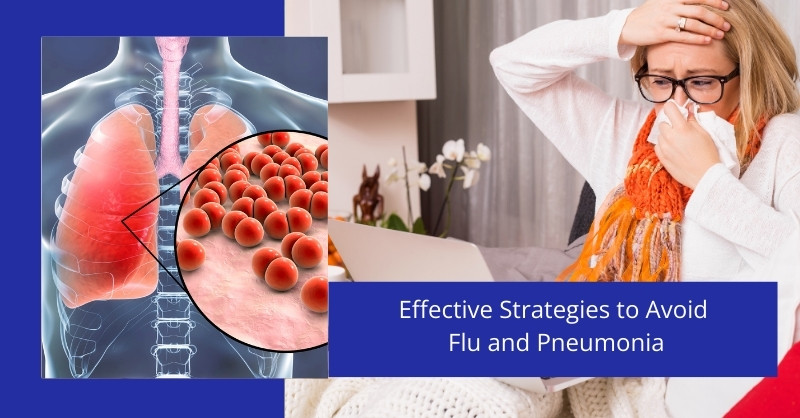Preventing flu and pneumonia requires a comprehensive approach that combines vaccination, proper hygiene habits, a healthy lifestyle, and heightened awareness of the risks and symptoms associated with these respiratory illnesses. These diseases can have a severe impact on overall health, particularly in vulnerable groups such as older adults and young children. In this article, we delve into effective strategies for preventing flu and pneumonia, helping you take proactive steps toward better health.
Understanding Influenza and Pneumonia: Key to Prevention Strategies
Preventing Flu and Pneumonia is essential to reducing the risk of serious health complications. Influenza, commonly known as the flu, is a contagious viral infection that affects the respiratory system. It spreads mainly through droplets from coughing, sneezing, or touching contaminated surfaces. In some cases, the flu can lead to severe complications, including bacterial pneumonia.
Pneumonia itself is an infection that inflames the air sacs in one or both lungs, which can fill with fluid or pus. It can be caused by various pathogens, such as bacteria, viruses, and fungi. Complications of pneumonia include difficulty breathing, bloodstream infections, and lung abscesses.
Given the potential severity of these illnesses, preventing flu and pneumonia through vaccination, good hygiene, and awareness is critical for reducing their impact on individuals and communities.
Vaccination: A Powerful Tool for Flu and Pneumonia Prevention
First and foremost, vaccination remains the cornerstone of flu and pneumonia prevention. Annual flu vaccines are recommended for everyone aged six months and older. These vaccines are reformulated yearly to target the most common strains expected during each flu season. For those at higher risk, such as pregnant women, older adults, and people with weakened immune systems, flu vaccination can prevent severe complications and hospitalizations.
In addition to flu vaccines, pneumonia vaccines are available and highly effective for certain types of pneumonia. The Pneumococcal Conjugate Vaccine (PCV13) and Pneumococcal Polysaccharide Vaccine (PPSV23) are recommended for high-risk groups, including older adults, individuals with chronic health conditions, and young children.
Because vaccination is not only a personal health measure but also a public health responsibility, it reduces the overall spread of these infections, thereby protecting those who are unable to receive vaccines for medical reasons. Therefore, consult your healthcare provider to determine which vaccines are appropriate for you.
Hygiene Practices: Preventing the Spread of Flu and Pneumonia

Good hygiene practices are essential for limiting the transmission of flu and pneumonia. Follow these evidence-based habits to protect yourself and others:
- Frequent handwashing: Use soap and water to wash your hands for at least 20 seconds, especially after coughing, sneezing, using the restroom, or touching high-contact surfaces.
- Hand sanitizer: Carry an alcohol-based hand sanitizer (with at least 60% alcohol) for situations where soap and water are unavailable.
- Cough and sneeze etiquette: Cover your mouth and nose with a tissue or your elbow to prevent droplets from spreading. Dispose of used tissues immediately.
- Avoid touching your face: Reduce the likelihood of transferring pathogens from your hands to your eyes, nose, or mouth.
- Clean surfaces regularly: Disinfect frequently-touched surfaces, such as phones, keyboards, countertops, and door handles.
By practicing these hygiene habits consistently, you significantly decrease your risk of contracting or spreading these infections.
Lifestyle Strategies for Building Immunity and Preventing Flu and Pneumonia
A strong immune system is your body’s natural defense against infections, including influenza and pneumonia. Lifestyle choices play a vital role in maintaining and improving immune function.
For instance, a nutrient-dense diet including plenty of fruits, vegetables, lean proteins, and whole grains provides essential vitamins and minerals that support your immune system. Moreover, regular exercise, such as brisk walking or yoga, helps improve circulation and strengthens immune defenses.
Additionally, getting 7-9 hours of quality sleep each night allows your body to repair and restore its defenses. Managing stress through mindfulness or deep breathing exercises further prevents chronic stress from weakening your immune system.
Finally, staying hydrated by drinking adequate water ensures your body can function optimally, aiding in infection resistance.
Preventing Complications in High-Risk Groups

While everyone is susceptible to flu and pneumonia, certain populations are more vulnerable to severe outcomes. These include:
- Older adults (aged 65 and above)
- Young children under five years old
- Pregnant women
- People with chronic conditions such as asthma, diabetes, or heart disease
- Individuals with compromised immune systems (e.g., cancer patients or organ transplant recipients)
To protect these groups, preventive measures extend beyond vaccination and hygiene. Regular health check-ups, effective management of chronic conditions, and early treatment of infections are essential steps. Additionally, caregivers for high-risk individuals should take preventive measures such as wearing masks and practicing strict hygiene to reduce exposure risks.
Recognizing Symptoms and Seeking Early Treatment for Preventing Flu and Pneumonia
Because early detection of influenza or pneumonia can significantly improve treatment outcomes, knowing the symptoms is essential. Watch for signs like fever and chills, persistent cough, shortness of breath, chest pain, or extreme fatigue.
Seek medical attention if symptoms worsen or are accompanied by confusion, bluish lips, or a high fever. In such cases, early diagnosis and treatment with antiviral or antibacterial medications can reduce the risk of complications.
The Long-Term Benefits of Preventing Flu and Pneumonia
The advantages of preventing flu and pneumonia extend beyond avoiding immediate illness. For example, preventing these infections can help reduce missed workdays, improve overall quality of life, and protect against severe complications such as hospitalizations or respiratory failure.
Furthermore, widespread prevention lowers the burden on healthcare systems, reduces costs, and conserves resources, especially during flu seasons.
Conclusion: Empowering Yourself Through Prevention
Preventing flu and pneumonia is achievable through a multifaceted approach that incorporates vaccination, hygiene practices, lifestyle adjustments, and awareness. By prioritizing these strategies, you can reduce your risk of contracting these illnesses and improve your overall health resilience.
Ultimately, prevention is a powerful tool—empower yourself to stay ahead of these respiratory illnesses and enjoy better health today and in the future. Remember to consult your healthcare provider for tailored advice and guidance.



